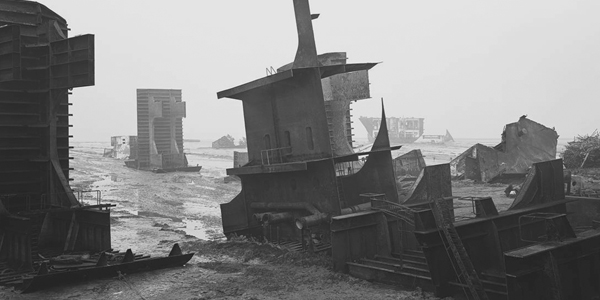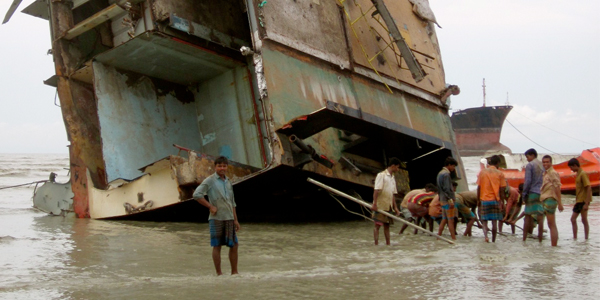
By Mandy
Solitary Bengali men stood around, barefoot, their knee-length lungi (a long cloth tied around the waist) dripping with mud and sea water. A few aligned to tug a rope tied to a hunk of metal that sat, upturned, several yards to my right. Some were gazing out into the junk-filled horizon, perhaps thinking about the work that still needed to be done. But most had stopped to stare at my friend and I, two non-Bengali American women, as we took in our surroundings.
Ship breaking, literally the breaking down of ships into scrap for recycling, can occur in a wide range of facilities but has often been steeped in controversy. Its lack of stringent labor regulations and the harmful environmental effects of the ships’ toxic substances have caused most industrialized countries to end the practice decades ago, though high-tech “Green Ship Recycling” have greatly improved its execution. However, in developing countries like Pakistan, India, Turkey, and Bangladesh, more “low-tech” ship breaking continues. Chittagong, located along the Bay of Bengal in Bangladesh, is the site for “the largest ship breaking yard in the world” (according to its manager), which I visited last week.
How does this process work here? First, competing companies bid on these ships from all over the world, paying millions of dollars in hopes of making an even bigger payoff. Once a ship is purchased it is taken to the yard, where pages of hand-written paperwork must be completed. The Bangladeshi navy and customs offices, both conveniently located in the city, must sign off on any ship that arrives before it can be broken.
For one of the ships before me, which once weighed eight tons and cost 27 crore BDT (about 3.6 million USD), a team of around 80 local Bengali men were contracted to work day and night to dismantle it. From start to finish it will take three to four months to complete, though larger ships may take more time and manpower. It was about 80% finished, I was told, and the hunk that lay near me was the ship’s turbine. Staring at this distant ship, it did look as if the first four-fifths of the ship were cleanly sliced off.
After the ship is broken, every single piece is re-made and/or re-sold. Steel is melted down into rods and exported; thus, it is possible for a ship that was bought from China to be re-sold back to China as raw material. Door fixtures, toilets, rescue boats, furniture, anything that can be itemized is re-sold domestically or internationally. This is how the yard makes its profits.

When asked about labor and safety regulations for the workers, the manager was quick to admit the faults but defend the improvements. There were no standardized laws five years ago, he told me, but last year the ISO (International Organization for Standardization) implemented rules for all ship breaking yards to follow. This included clear bilingual – Bengali and English, in this case – labeling of all facilities including the infirmary, wash room, clean drinking water, and so forth. Signs like “Remember somebody is waiting for you at home” that were posted randomly around the yard kept up morale and safety, presumably. Toxic substances, such as asbestos, were dealt with in their own separate building. The manager spoke about how these men were in poor health but these regulations are helping to improve their lives. However, while watching the workers use blowtorches and handling rusted parts of old engines without protection, I asked the manager if the laborers ever wear protective gear. He replied, “When the safety inspector comes,” without a hint of irony.
The manager argues that without his ship yard, hundreds would be unemployed. Indeed, beyond the office workers and laborers on-site, the surrounding community’s economy has been transformed by the goods from the ships. Huge, neat piles separated by item line the long highway leading up to the yard, and they are all for sale. The manager said that it wasn’t like this ten years ago, and it’s all thanks to his company. But at what cost?
Throughout the day the manager excused himself to deal with some “problems” with an incoming ship. It was clearly an issue, but he didn’t seem that bothered by it. The next day I came across this article about a toxic ship bound for Chittagong and couldn’t help but note the coincidence. Whether or not this news related to the manager’s yard, I still wondered about the other things didn’t seem to bother this man.
ABOUT THE AUTHOR: Mandy Choie is teaching at the Asian University for Women in Chittagong, Bangladesh.
- Excited
- Fascinated
- Amused
- Disgusted
- Sad
- Angry








